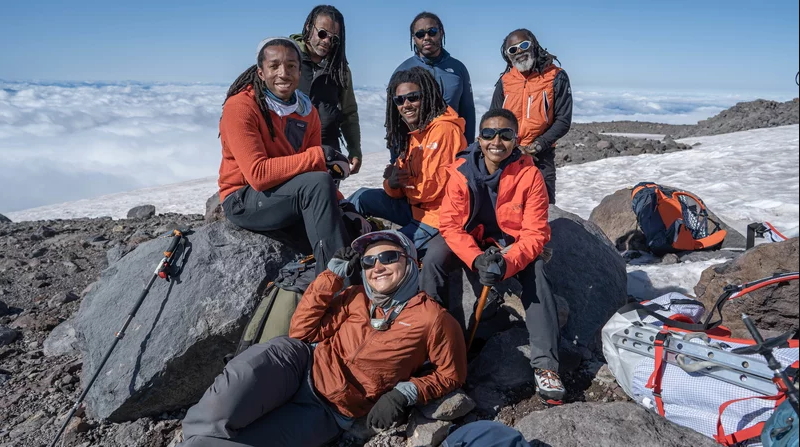KATHMANDU: A team of nine, highly qualified, all Black climbers want to set the record by climbing Mt Everest.
The team compromises, team leader Philip Henderson, 58, Rosemary Saal, 28, Eddie Taylor, 31, Abby Dione, 45, James Kagambi, 60, Manoah Ainuu, 25, Fred Campbell, 37, Demond Mullins, 40, Thomas Moore, 37, and Adina Scott, 41.
According to Washington Post, the team is climbing the highest peak in the world under the name of the Full Circle Everest Expedition. The team leader Henderson said the project is about “summiting Everest first,” and “everything else second.”
“But with 30 years of climbing, mountaineering, and working in the outdoors industry, often as the only Black person in any group, the Everest expedition as a way to bring diversity and change to his chosen field”, ””The analogy I like to use is that there’s a cruise ship that has been headed in one direction,” he says quoted by Washington Post. “It’s time to turn it around.”
Full Circle members Rosemary Saal, Philip Henderson, and Fred Campbell ascend Mount Rainier under the moonlight in Washington state in 2021.
Like any other team intending to tackle the world’s highest mountain, the Full Circle members will have to put in months of training, fundraising, all the while serving as representatives to and for a population that for the most part hasn’t had exposure to the world of mountaineering.

“I hear ‘Black people don’t do that,’ all the time when I talk about my climbing that only perpetuates the stereotypes. It’s important to change the narrative.” team member Rosemary Saal said quoted by the post.
The climbers hope that seeing a group of Black Americans atop Everest will change that narrative, in part by creating stories that show it can be done. “It’s hugely significant to contribute to representation in these outdoor spaces,” Saal says, the Washington Post quoted.
Statistically, there’s a huge racial gap in who most commonly benefits from outdoor spaces and participates in outdoor activities. Nearly 70% of visitors to national parks, forests, and wildlife preserves are white and Black people visit these sites the least out of any group, according to a National Health Foundation report.
But the reasons why are far from simple. Racism is a factor: Due to segregation, Black people, historically, have had to face feeling unwelcome and even unsafe in many public spaces, as one Resources report pointed out.
“There’s been an intentional lack of access for Black people. When Hillary first summited [Everest], Black people couldn’t even vote in this country” and national parks had only recently been desegregated, Saal says. “This expedition is all about showing, ‘Yes, we can do this.’ ”

As its website explains, the first American group reached the top of Everest in 1963, the same year that Dr. Martin Luther King Jr. delivered his “I Have A Dream” speech. It took 40 more years for the first Black climber to summit Everest. Still, there has never been an all-Black team to summit the tallest mountain on Earth. Reaching the top would be a full-circle moment for them, and it’s one that they hope will inspire other Black folks to reach their goals, whatever they may be.
While Henderson likes to say that “the team picked itself,” he is the nucleus and mentor to the others, having conceptualized the project and invited each member. This will be Henderson’s second attempt at the summit, the first an unfinished bid back in 2012.
“Each team member has the experience to say that Everest is a challenge,” Henderson says, “but they all have the skills.”
Even with the necessary skills and their mountaineering experience, Everest, at about 29,032 feet, takes special preparation. Each of the Full Circle climbers is training on his or her own right now, but there are plans for more big-mountain-specific training in the new year, ideally as a group.
“We have to be a bit spontaneous to work around everyone’s schedules and commitments,” Henderson says. “But some of us are getting in climbs up 14rs [peaks that top out over 14,000 feet], where we can. If we had the option of getting together and training regularly, we would,” the Washington Post reported.
While climbing Everest has not been a long-held personal goal, Saal says that the mountain is usually in the back of every climber’s mind.
“Even people who don’t know much about the sport know Everest, and so I’m always asked if I plan to climb it,” she says. “When Phil called, I said yes immediately.”
Saal says she has a “healthy dose” of nerves. “My ultimate goal is to come back from the expedition and that our team contributes to the safety of the mountain,” she says. “I’m mentally and emotionally preparing and remind myself that if the mountain allows us to climb it, that’s beautiful.”

A standard supported climb can range from about $30,000 to $85,000 per person. For custom climbs, where you choose your teammates, guides, and guide ratio, the price tag can run well over $100,000 per person.
To help defray those costs, Full Circle has lined up the support of several mountaineering brands although the group is still seeking donations.
“The expedition is very timely, as I think many brands and organizations are beginning to recognize the colonial history of mountain climbing,” Saal says — meaning the history of White male climbers, many from the British Empire that once ruled over India and the Himalayas — and are supportive of an effort to change the face of the sport and bring in traditionally marginalized populations.
Taylor says that as more people hear about the effort, interest and financial support have picked up.
“A month or so ago, things were kind of quiet,” he says. “But now we know we’re going to Everest. I’m happy to be part of a story that hasn’t been shared before, Washington post writes.
Around 6,000 have successfully climbed Mt Everest so far. But the team says only 10 of those have been Black.
The group will be heading to Everest this year, during the main climbing season in April and May, for a grueling 60-day endeavor.
Meanwhile, some of the team members have already arrived in Nepal and enjoying their trip to the Everest region.
(with inputs from Washington Post and Agencies)









Comment